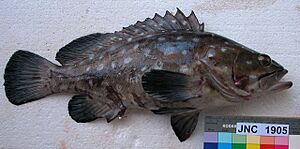Whitespotted grouper facts for kids
The whitespotted grouper (Epinephelus coeruleopunctatus) is a cool fish that lives in the ocean. It's also known by other names like the rankin cod or whitespotted rockcod. This fish is a type of grouper, which belongs to a larger family of fish called Serranidae. This family also includes sea basses. You can find the whitespotted grouper in the Indo-Pacific region, which covers a huge area from East Africa all the way to places like Japan and Australia.
Quick facts for kids Whitespotted grouper |
|
|---|---|
 |
|
| Conservation status | |
| Scientific classification | |
| Synonyms | |
|
Contents
What the Whitespotted Grouper Looks Like
This grouper is a medium-sized fish. It can grow up to about 76 centimeters (30 inches) long. Its body is quite deep, meaning it's taller than it is wide.
- Fins: It has a dorsal fin (on its back) with eleven spines and about sixteen soft rays. Its anal fin (on its belly) has three spines and eight soft rays. The fins near its belly are short, and its tail fin is rounded.
- Color and Spots: The whitespotted grouper is usually dark brownish-grey. It has big white blotches all over its head, body, and dorsal fin. If the fish is larger, over about 30 centimeters (12 inches), these white spots might join together to form wavy lines or a mottled pattern.
Where the Whitespotted Grouper Lives
You can find the whitespotted grouper in shallow ocean waters across the Indo-Pacific region. Its home stretches from the coast of East Africa and the Persian Gulf. From there, it goes eastward to countries like Japan, China, and Indonesia. It also lives around Australia, Fiji, and Tonga.
Life in the Ocean
The whitespotted grouper is a demersal fish. This means it lives near the bottom of the ocean. It prefers shallow waters around reefs.
- Habitat: You'll often spot it in rocky areas or near coral growth. It likes deep lagoons, outer reef slopes, or channels. Sometimes, it hides in or near caves.
- Behavior: Unlike some fish that swim in big groups, the whitespotted grouper is usually seen alone. It's not a schooling fish.
- Diet: This fish is a hunter! It eats small fish and crustaceans. Crustaceans, like crabs and shrimp, make up most of its meals.
Conservation Status
The whitespotted grouper lives in a very large area. It's common in some places but not so common in others. We don't know exactly if its numbers are going up or down. People do catch this fish for food in small, local fisheries.
The International Union for Conservation of Nature (IUCN) has looked at the whitespotted grouper. They decided its conservation status is "least concern". This means it's not currently in danger of disappearing.
A Bit About Its Name
The whitespotted grouper was first officially described in 1790. A German scientist named Marcus Elieser Bloch gave it the scientific name Holocentrus coeruleopunctatus. Scientists believe it was first found in Indonesia. This fish is related to other groupers that also have white spots, like Epinephelus ongus and Epinephelus summana.


